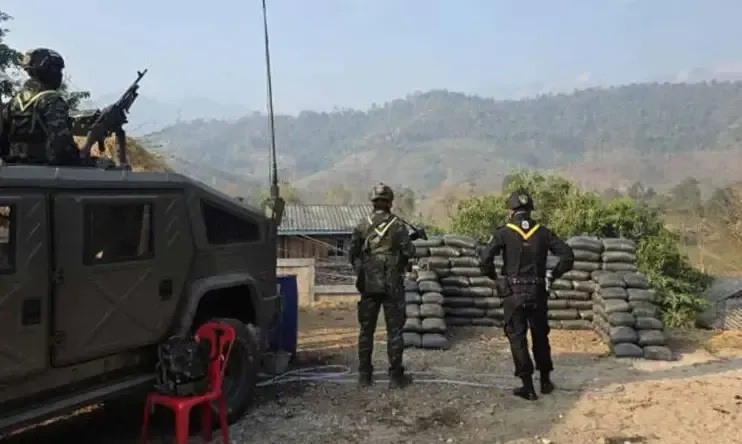
On May 28th local time, Thai and Cambodian soldiers engaged in a brief exchange of fire in the border area between the two countries, which lasted for about 10 minutes and resulted in the death of one Cambodian soldier. This is not the first conflict between the two countries. For a long time, the territorial dispute surrounding the area around the Preah Vihear Temple has made the relationship between the two countries sometimes tense. This conflict not only raises geopolitical concerns, but its impact on the economies of both countries cannot be ignored.
From a trade perspective, Thailand and Cambodia have close economic ties. By 2023, the trade volume between Thailand and Cambodia has reached 9.8 billion US dollars, and the two sides have frequent trade exchanges in agriculture, industrial products, and other fields. The first impact of border conflicts is border trade. Fruit exporters in northeastern Thailand are facing logistics disruptions, as fruits such as mangosteen and longan that were originally transported to Cambodia through border ports have to detour through Laos, resulting in a 30% increase in transportation costs. The durian market in Champasak Province, Cambodia has also been paralyzed, with daily losses exceeding one million US dollars. If the conflict continues, Thailand may close more border ports, which will seriously affect the export of goods such as cars and motorcycle parts. Cambodia, which relies on Thai ports for 35% of its exported goods, will also face transportation difficulties, which will have a chain reaction on the trade surplus and foreign exchange reserves of the two countries.
In terms of tourism, Thailand's tourism industry contributes 12% of GDP and is one of the important economic pillars. Scenic spots such as Angkor Wat in Cambodia also attract a large number of international tourists. Border conflicts can make tourists worry about the safety of both countries, thereby reducing their willingness to travel. According to relevant data, the number of tourists to Angkor Wat in Cambodia has decreased by 15% due to conflicts. As a border area with Cambodia, Sihanoukville in Thailand experienced a sharp decline in tourism revenue and hotel occupancy rates during the 2011 conflict, putting tourism workers at risk of unemployment. The downturn in the tourism industry will also affect related industries such as hotels, catering, and transportation, affecting Thailand's economic growth and social stability.
On the investment front, in recent years, the Cambodian government has introduced a series of preferential policies to attract a large number of foreign companies to invest in setting up factories, including many Thai companies. Thailand has also made arrangements in Cambodia's infrastructure construction, energy development, and other fields. Border conflicts can cause foreign investors to have doubts about the investment environment of the two countries, fearing that investment projects will be affected by the conflict, thereby reducing investment. This is undoubtedly a huge blow to the two countries that urgently need funds and technology to promote economic development. For example, Cambodia is seeking Chinese investment to build high-speed rail, and conflicts may interfere with project progress, while Thailand may also lose the opportunity to take advantage of Cambodia's cheap labor and preferential policies.
From the perspective of industrial development, the Gulf of Thailand has abundant natural gas resources, and it is estimated that the energy reserves in this area are worth approximately 557 billion US dollars. Thailand and Cambodia have a sovereignty dispute in the Gulf of Thailand, and both sides hope to develop natural gas resources in this area to meet domestic energy needs and promote economic development. However, due to territorial disputes that have not been resolved, there is an urgent need to develop new resources as Thailand's proven natural gas resources gradually deplete; Cambodia also hopes to use this to promote its own economy. The border conflict has hindered the development plans in the region, not only affecting the energy security and economic development of the two countries, but also further exacerbating tensions. In addition, the newly discovered rare earth deposits worth over 600 billion US dollars in the Preah Vihear region have become a focus of competition between companies from the two countries, and the conflict has stalled related exploration and development work.
As members of ASEAN, conflicts between Thailand and Cambodia not only affect their own economies, but may also have negative effects on ASEAN regional economic cooperation. ASEAN has always been committed to building a regional economic community, promoting trade liberalization and investment facilitation. The conflict between Thailand and Cambodia may undermine the atmosphere of regional economic cooperation and weaken investors' confidence in the overall investment of ASEAN.
Although the conflict has temporarily subsided and the military leaders of the two countries have agreed to withdraw troops from the border and seek a peaceful solution after meeting, the losses caused by the conflict to the economies of the two countries already exist, and the subsequent impact still needs to be continuously monitored. Under the downward pressure of the global economy, only by resolving disputes through peaceful negotiations can the two countries create a stable environment for economic development and achieve mutual benefit and win-win results.

According to a recent report by Rich Asplund, a columnist for Barchart, the global sugar market is currently experiencing a complex and profound supply-demand game.
According to a recent report by Rich Asplund, a columnist f…
On January 13th local time, the three major US stock indice…
Recently, the 2026 edition of the MIT Technology Review lis…
On January 15, 2026, the US military announced the seizure …
At the 2026 J.P. Morgan Healthcare Conference, a joint anno…
For much of 2025, the market was rethinking whether the dol…